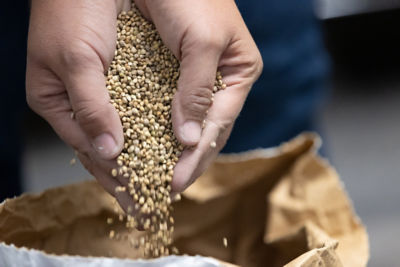Did you know that February is National Canned Food Month? Well if you did not, now is the time of year when many people celebrate the process of canning food and the benefits it has in our daily lives. However there are still many who are not familiar with the canning process and others who question if canned food is a healthy option to include in their diet.
Canning is the method of preserving food in which the contents are processed and sealed in an airtight container. In vegetables, it is most common for the vegetables to be washed, cut into little pieces or used whole, and then put into containers. The containers are then put through a high heat treatment to ensure that different types of bacteria spores are sterilized. The containers seal after the heating process due to the creation of a vacuum like tendency that is developed as the containers cool to room temperature.[1] Properly canned vegetables can be stored at room temperature for years depending on the contents making locally or garden grown vegetables easily accessible year-round.
A common perception around canned vegetables is that they are not as healthy as their fresh or frozen counterparts, but that is not necessarily the case. A 2007 study conducted by the University of California at Davis found that studies of produce on the retail market and USDA nutrient data reveal that cooked, canned and frozen products can contain similar or higher levels of ascorbic acid as cooked fresh products, depending on commodity. Moreover, canned foods such as tomatoes and pineapples can make significant contributions to the RDA for vitamin C[2]. This is even more important when the World Health Organization (WHO) ) estimates that worldwide consumption of fruits and vegetables is only 20–50% of the recommended daily minimum of 400 g per person.[3] Fresh, frozen and canned fruits and vegetables each contain important nutrients and contribute to a healthy diet. The canning process allows for vegetables to be easily accessible year round and still contribute to a healthy lifestyle.
A recent report published in 2014, showed that canned fruits and vegetables can be part a higher total fruit and vegetable intake in children and contribute towards a better overall diet.[4] This new finding comes at a time where the diets and unhealthy lifestyles of American children are coming into question for continuing to fall short of the nutritional recommendations established through the Dietary Guidelines for Americans. According to a CDC report, nine out of ten American children are not eating enough vegetables and six out of ten are found to not eat enough fruit.[5]
At Seminis®, our breeding and technology development teams strive to develop products that meet the unique needs of vegetable growers. In partnership, we are able to meet the demands of a growing population and providing healthy vegetables in all forms, be it fresh, frozen or in a can.
[1] Vegetable Processing. (2015). In Encyclopædia Britannica. Retrieved From Http://Www.Britannica.Com/EBchecked/Topic/624615/Vegetable-Processing/50276/Canning
[2] Joy C. Rickman, Diane M. Barret, And Christine M. Bruhn. (2007). Review Nutritional Comparison Of Fresh, Frozen And Canned Fruits And Vegetables. Part 1. Vitamins C And B And Phenolic Compounds. Journal Of The Science Of Food And Agriculture , 930-944.
[3] U.S. Department Of Agriculture And U.S. Department Of Health And Human Services. Dietary Guidelines For Americans, 2010. 7th Edition, Washington, DC: U.S. Government Printing Office, December 2010.
[4] National Center For Chronic Disease And Prevention And Health Promotion, Divison Of Nutrition, Physical Activity, And Obesity(2014). Progress On Children Eating More Fruit, Not Vegetables. Atlanta: CDC Vital Signs.
[5] U.S. Department Of Agriculture And U.S. Department Of Health And Human Services. Dietary Guidelines For Americans, 2010. 7th Edition, Washington, DC: U.S. Government Printing Office, December 2010.




